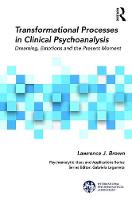The Fragmented Personality: An Integrative Dynamic and Personalized Approach to Personality Disorder

Book Details
- Publisher : Oxford U.P.
- Published : January 2019
- Cover : Paperback
- Pages : 360
- Category :
Individual Psychotherapy - Catalogue No : 93999
- ISBN 13 : 9780190884574
- ISBN 10 : 9780190884
There are currently no reviews
Be the first to review
The Fragmented Personality presents new model for caring for patients with personality disorder in post-modern society. In contrast to the static classifications of personality pathology, the authors' approach yields a personalized diagnosis that is contextual, dimensional, and time-specific and at the same time provides information about the current position of the individual in relation to the important components of personality functioning. In this model of dimensional diagnostics, two intersecting coordinates, one representing the person's level of functioning (the "what" of the diagnosis) and the other his/her adaptive style (the "how" of the diagnosis) are cross matched in the unit of time. This gives the psychiatrist precise milestones for monitoring progress in therapy.
Why does this matter for psychiatry in post-modern society? Drs. Svrakic and Jovanovic argue that the ideals of mental health traditionally have been stability and integrity. In the context of the postmodern world, these ideals may sound outdated, possibly even implying inflexibility or narrow mindedness. The postmodern "fragmented self" is a natural, adaptive answer to the changing existential milieu of humans. This fragmented, decentered self consists of incoherent and abstract images, not derived solely from traditional social interactions, but created by the postmodern culture. Borderline personality is fragmented at its unconscious core of internalized object relations, resulting in specific borderline psychopathologies or a "fragmented personality."
Drs. Svrakic and Jovanovic analyze the impact of recent dramatic social transitions on adaptive tasks, personality and psychopathology. They introduce the concepts of monothematic self of the conservative era and the multi-thematic self of the postmodern era and discuss their relevance to the changing concepts of psychopathology. The authors argue that the conservative society, with strong nuclear family and strict ethical and religious norms, favored the psychopathology of neuroses centered around guilt, including guilt for not fitting the preapproved social norms. With the liberalization of normative pressures in the postmodern period, the adaptive task has changed into "what to choose" among many accepted alternatives, creating uncertainty of choice. This uncertainty, together with the non-directive society, favors the psychopathology of personality disorder, and indeed, the prevalence of personality disorder has increased in the postmodern period.
In addition to discussing their conceptual model, the authors provide detailed practical guidelines for the diagnosis, differential diagnosis, and treatment when using their model in the management of personality disorder. They answer practical questions that clinicians frequently ask about etiology, psychotherapy and pharmacotherapy of personality disorder. The authors also detail Reconstructive Interpersonal Therapy (RIT), their variant of interpersonal psychotherapy which integrates humanistic and psychoanalytical paradigms in the treatment of personality disorder.
Customer Reviews
Our customers have not yet reviewed this title. Be the first add your own review for this title.
You may also like
Silent Virtues: Patience, Curiosity, Privacy, Intimacy, Humility, and Dignity
Salman Akhtar
Price £31.49
save £3.50
Transformational Processes in Clinical Psychoanalysis: Dreaming Emotions and...
Lawrence J. Brown
Price £29.69
save £3.30
The DSM-5 Alternative Model for Personality Disorders: Integrating Multiple...
Christopher J. Hopwood
Price £38.94
save £2.05
Understanding Mechanisms of Change in Psychotherapies for Personality Disorders
Ueli Kramer
Price £49.50
save £5.50







